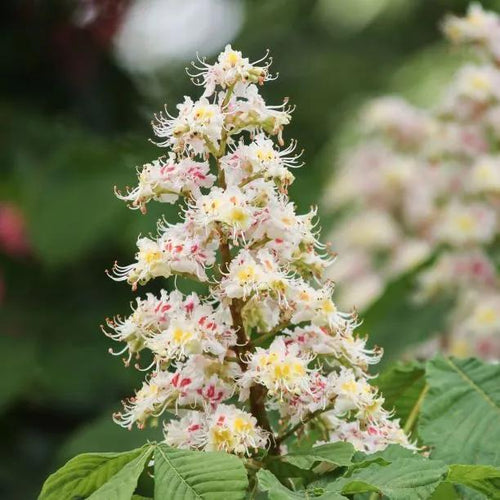
 Delivered across the UK
Delivered across the UK Which Best Plant Supplier 2025
Which Best Plant Supplier 2025 1 Year Bareroot Plant Guarantee
1 Year Bareroot Plant Guarantee
About White Horse Chestnut Trees
White Horse Chestnut Trees
The White Horse Chestnut, Aesculus hippocastanum Baumannii, has double flowers that are mostly white, with small pink dots in the centre. It's smaller than the Wild Horse Chestnut, so it's a better choice for a garden and has more ornamental value, because you can see more of the flowers from the ground.
It's a sterile tree, so you won't have any conkers to clear off pathways. This may be bad news for the kids, but it also means that this tree is safe to plant around livestock as Horse Chestnuts, despite the name, are poisonous to most animals.
They can reach a height of about 20-25 metres with a spread of 15 metres.
Browse our other varieties of Chestnut tree, our or complete list of trees.
Delivery season: White Horse Chestnut trees are delivered bareroot during late autumn and winter, approximately November-March inclusive.
Choosing a size: Small trees are cheaper, easier to handle and more forgiving of less than ideal aftercare, so they're best for a big planting project. If instant impact is your priority, or if you are only buying a few plants for use in a place where it's convenient to water them well in their first year, then you may as well use bigger ones. All our bareroot trees are measured by their height in centimetres above the ground (the roots aren't measured).
Features
- Height: 20-25m
- Soil: Any well drained
- Use: Specimen, parkland, avenue, urban
- Colour: Mostly white, double flowers in May-June
- Safe for horses
- Bareroot delivery only: November-March
Growing Baumannii Chestnut Trees
Any well drained soil. Full sun is ideal, but it's fine to plant in partial shade where they'll grow into the sun. Tolerant of pollution.
History & Trivia
Baumannii appeared as a natural mutation, called a sport, of the common chestnut around 1820, discovered by Constantin Auguste Napoleon Baumann (1804-1884), who would go on to be one of the managers of Baumann FrC(res plant nursery in Bollwiller, France (some records say that he discovered the sport on a tree near Geneva).
It is sometimes listed as Aesculus Flore Pleno.
Standard trees are measured by their girth in centimetres 1 metre above ground level: their trunk's waist measurement. Unlike sapling trees and hedge plants, standards aren't measured by their height, which will vary quite a bit both between and within species.
So, a 6/8cm standard tree has a trunk with a circumference of 6-8cm and an 8/10 standard has a trunk 8-10cm around. This measurement makes no difference to the tree's final height.
On average, standard trees are 2-3.5 metres tall when they arrive, but we cannot tell you precisely how tall your trees will be before we deliver them.













 Secure, One-Tap Checkout
Secure, One-Tap Checkout
 Hand Picked, Delivered to Your Door!
Hand Picked, Delivered to Your Door! 1 Year Bareroot Guarantee
1 Year Bareroot Guarantee







